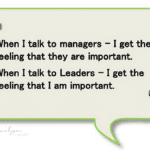I think as a general rule, people are happy when their expectations are met. If Mr. Bartender and I go out to dinner, we expect a nice meal. When our expectations are met, we’re happy. When they aren’t, we’re disappointed.
Same happens with candidates. When they accept a job offer, they expect to like their job and the company they’re working for. When that happens, they’re happy and engaged. When it doesn’t, they are disengaged and eventually leave. Or maybe they are disengaged and stay. Either way, it’s not good.
Hiring managers have expectations too. I’ve never met a hiring manager that extends an offer to an employee thinking, “I expect this candidate will be a real loser. Their performance will be awful and in a few months, I’ll have to start performance managing them out the door.” No, managers hire employees with the expectation that they’ll learn about their job, like their work, and perform well.
All of this points to the onboarding process. Onboarding sets the stage for expectations to be met or disappointment to start sinking in. So, organizations need to ask themselves, “What does onboarding mean to our organization?” Not the process, but what’s the expectation. Processes can change. Organizations should strive to find out these two things:
What do new hires expect during onboarding? I can see some common responses including how do employees get paid, when do employee benefits start, and how do employees do their job.
What are manager expectations for onboarding? Common responses are building relationships with employees, training new hires on their job duties, and communicating the company performance standard.
The answers to these questions will impact WHAT takes place during onboarding. And WHEN it happens. Oh, and HOW it’s communicated. Even WHO is responsible. An organization might decide to add a technology solution to handle preboarding. Orientation might be shorted to a couple of hours on day one with a follow-up session a few weeks later. Managers might decide to team teach sections of orientation with HR. All in the realm of possibilities, if the organization knows what is expected.
So, add a piece to your current onboarding process. Get feedback from both employees and managers. Find out from employees if the organization is delivering what the company promised. Ask managers if new hires are developing on the job as expected. Let me also suggest that it might make sense to do this several times during the first six months of employment. Everything could be fine during the first month; only to not be fine at 90 days.
Employee onboarding is about setting expectations. Failure to do so will only lead to disengagement and disappointment by employees and managers.
Image captured by Sharlyn Lauby while exploring in South Florida








[…] Read the full story: http://www.hrbartender.com/2017/recruiting/onboarding-successful-expectations-met/ […]